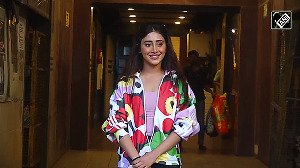Namita Devidayal's The Music Room traces the life of three music legends -- Alladiya Khan, Kesarbai and Dhondutai. Two of them became legends; the third, Dhondutai, kept the flame of the Jaipur Gharana burning through the film of obscurity.
An excerpt from the book:
I went back to Kennedy Bridge the following week. In our first lesson, Dhondutai asked me to shut my eyes and listen to the singer's loyal accompanist, the tanpura. I was intrigued by the instrument, which looks like a sitar but plays just four notes over and over again. She ran her fingers over the strings and a hypnotic rhythmic drone started to fill the room. It created a constant murmur of serenity. Soon, all the ambient sounds -- the whirring of the fan, the soft tick-tock of the table clock, the occasional shouts from children or vendors outside, Ayi's gentle snoring, the hissing of the pressure cooker from the kitchen -- found their place against this background drone. From then on, the language we heard and spoke was that of music.
I started with the first note, sa. On that first day, to my dismay, Dhondutai made me sing only the base note -- the tonal pillar of Indian music which remains unchanged, constant, reliable, and stoically oblivious to the whims and fancies of other notes. It is the foundation, the first and last note, the point at which the circle begins and ends. Within the boundaries of sa, one can play out all of life's dramas and moods. But every time one gets back to it, there is a sense of closure -- like coming home after a long and exciting journey.
'Make the sound of your sa merge into the sa of the tanpura until both are one and you can't tell the difference,' said Dhondutai. 'Sa encompasses all the notes, just as pure white light contains all the colors of the rainbow.' We finished our lesson in half an hour, a nod to my age and restless spirit. Dhondutai put the tanpura back in its resting place against the wall and shuffled into the kitchen. I followed her there, overwhelmed with curiosity.
The kitchen was a dark space with a single, small window that looked out onto a courtyard in the centre of the building. Dhondutai's entire culinary equipment fitted into a compact wooden cupboard in one corner. She pulled out a small, old-fashioned brass vessel and rinsed it.
A heavy-set woman, with a shocking white bob-cut and a dark face embedded with tributaries of suffering, emerged from the flat's other bedroom. It was the landlady, from whom my teacher had rented her room and the right to use the kitchen and bathroom. Dhondutai introduced me to Mausi, affectionately referring to me as 'her little student'.
Mausi smiled and held her hand out to me limply and I shook it, both of us mildly uncomfortable with this Western mode of greeting. I noticed her feathery moustache which she had trimmed unevenly, leaving behind bits of white stubble.
Dhondutai asked if I wanted tea, which I declined. As she started making it, she chattered on, and I stood next to her, leaning on the kitchen counter, listening. 'Making tea is a lesson in life,' she said. 'You think that you've made the tea just because you've put the kettle on the pot and dumped tea leaves into it. But take a deeper look at what's going on. Actually, someone has grown the tea leaves, someone else has pruned them, some poor fellow put them into packages. Someone has milked a cow and another has pressed sugar cane to give you sugar. And it is thanks to the fire that you can boil your water. So what you have done is a small speck in the scheme of tea-making. Never feel undue pride, for there is much more unseen energy contributing to your so-called achievement. What do you say, Mausi?'
'You are quite right, tai. It is all in God's hands,' said Mausi with a sigh, dabbing with the end of her sari the film of sweat misting her face from the steamy tea. Dhondutai laughed and poured the hot tea into two slightly chipped china cups and brought them into her room for her mother and herself. Ayi (Mother) picked up the cup with a quivering hand, and spilled most of the tea on to the ground. She looked up at us like a sheepish child.
'Why can't you be a little more careful, ayi?' scolded Dhondutai. 'How do you expect me to keep cleaning up after you? Here, give me that cup.' She shook her head and sighed. 'You didn't get burned did you?' Her voice softened and she went out to get a rag. Mausi walked in from the kitchen and gave Ayi a don't-worry smile. Ayi was looking at the floor. She slowly lay back on her bed and turned her face to the wall.
It was a touching scene. Three women in this tiny apartment, each with her own struggles and stories, supporting each other with empathy. One's face spoke of unhappiness, a husband who must have died in debt, leaving her a dark, peeling flat, half of which she had to rent out to keep from going hungry. The second had to cope with the shame of watching her body gradually detach itself from her mind.
The third was living with the pressure of knowing that she was born to deliver a creative gift to the world -- and that her mission had not been accomplished. For, there were always medicines to buy and dinner to be made. Life was a constant struggle between mundane chores and her unworldly art.
Excerpted from The Music Room, 320 pags, Rs 395, published by Random House India,© Namita Devidayal
The Music Room is being serialised by Gandharv, the Hindustani music channel of World Space Radio, all through September. Gandharv plays out live at https://worldspace.msnserver.com/gandharv.aspx.
DON'T MISS
The Namita Devidayal interview
Watch the trailer of The Music Room
Video: Namita and Dhondutai





